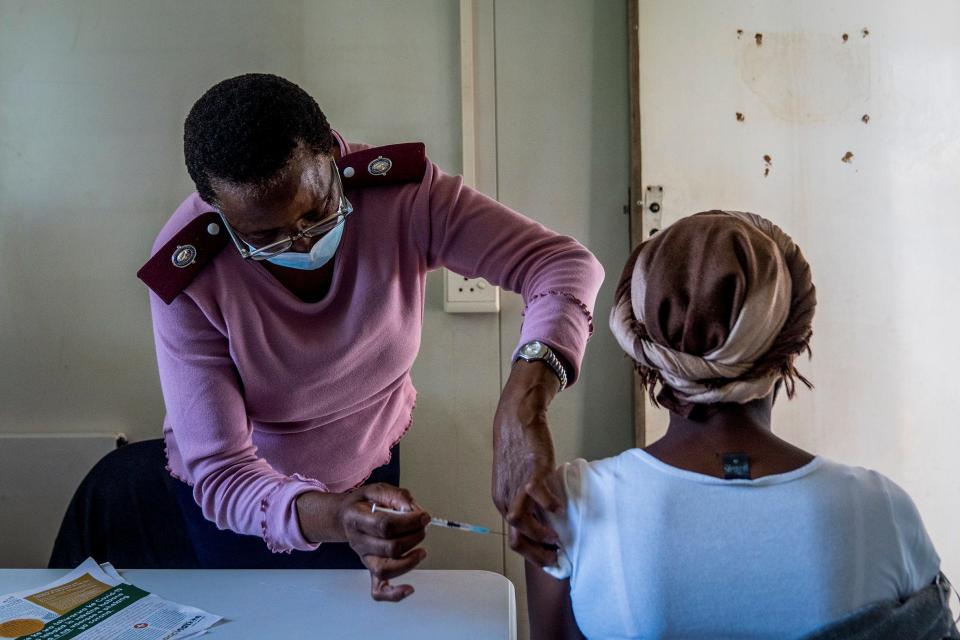South Africa is being hit hard by COVID again. Here is what that means for the US.
COVID-19 cases are skyrocketing in South Africa, as they did in the earliest days of the omicron outbreak.
It's too soon to know whether that will have any implications for the United States, but omicron exploded here right after Thanksgiving, only a few weeks after it took off there.
The viruses now spreading in South Africa are variants of omicron, dubbed BA.4 and BA.5.
The original omicron variant, called BA.1, now represents only about 3% of cases in the United States, according to Centers for Disease Control data. It was pushed out by BA.2, which accounts for 68% of current infections, and BA.2.12.1, which is approaching 30% of cases nationwide, after arising in New York state.
Nearly 60% of all Americans and 75% of children have been infected with the virus that causes COVID-19 since the pandemic began, the CDC said Tuesday.
BA.4 and BA.5 have arrived in Texas and likely other U.S. states, Dr. Jacob Lemieux, an infectious disease specialist at Massachusetts General Hospital in Boston, said in a call this week with media.
But the new variants currently account for only a tiny fraction of American cases and it's too early to know whether they will be any more dangerous or will evade vaccine protection.
"We'll see what the impact is and if they outcompete other variants here," Lemieux said. "They do look a lot like the other omicron variants that are circulating, so we would hazard a guess that some of their properties would similar, but we don't know."
"It does have a bit of a flavor of 'here we go again,'" he added.
So many people are getting infected in South Africa that many almost certainly already contracted omicron or other variants, showing that reinfection is possible if not likely
"Undoubtedly, reinfection is now a common feature of the coronavirus syndrome," Lemieux said.
It's impossible to tell at this point which combination of infections and vaccinations are most protective against each variant, Lemieux said, because there are so many possibilities – with some people vaccinated and infected once, multiple times or not at all.
About 30% of the South African population has been vaccinated, with many more of its 60 million residents infected.
These fast-spreading viruses have a growth rate advantage that also allows them to outpace the immune system's ability to fight them off, even in people who have been previously vaccinated or infected, Lemieux said.
"These are highly infectious viruses that will take every opportunity to transmit and cause epidemics," he said. "We're seeing that in South Africa right now. We're seeing that also across the world, where cases are going up."
In the United States, cases have been climbing in recent weeks after dropping since their mid-January peak, according to data from the CDC.

A new variant or subvariant is declared when the virus that causes COVID-19 accumulates genetic mutations. Omicron has more than 30 genetic spots that are different from the original coronavirus, which may explain why so many vaccinated and previously infected people were able to get infected.
When asked whether these new variants are now as contagious as measles, which holds the title of most contagious disease known to affect humans, Dr. Jeremy Luban, a molecular medicine expert at the University of Massachusetts Medical School, nodded yes. "We're approaching the range of the measles virus," he said.
Lemieux essentially agreed but said a comparison isn't quite that simple.
"I think at this point, it's kind of like: What's faster a Ferrari or a Lamborghini?" he said. "Unless you get these on the same racetrack on the same day, you may not be able to directly compare (them)."
Only time will tell whether the story of omicron's race around the world will be repeated with BA.4 and BA.5, Lemieux said. But he's anxious, and worried that without Congress devoting more money to fight the pandemic, the U.S. will be unprepared for another large outbreak.
"We are staring down a fifth wave," he warned.
Contact Karen Weintraub at kweintraub@usatoday.com.
Health and patient safety coverage at USA TODAY is made possible in part by a grant from the Masimo Foundation for Ethics, Innovation and Competition in Healthcare. The Masimo Foundation does not provide editorial input.
This article originally appeared on USA TODAY: South Africa is hit hard by COVID again. What does it mean for the US?

